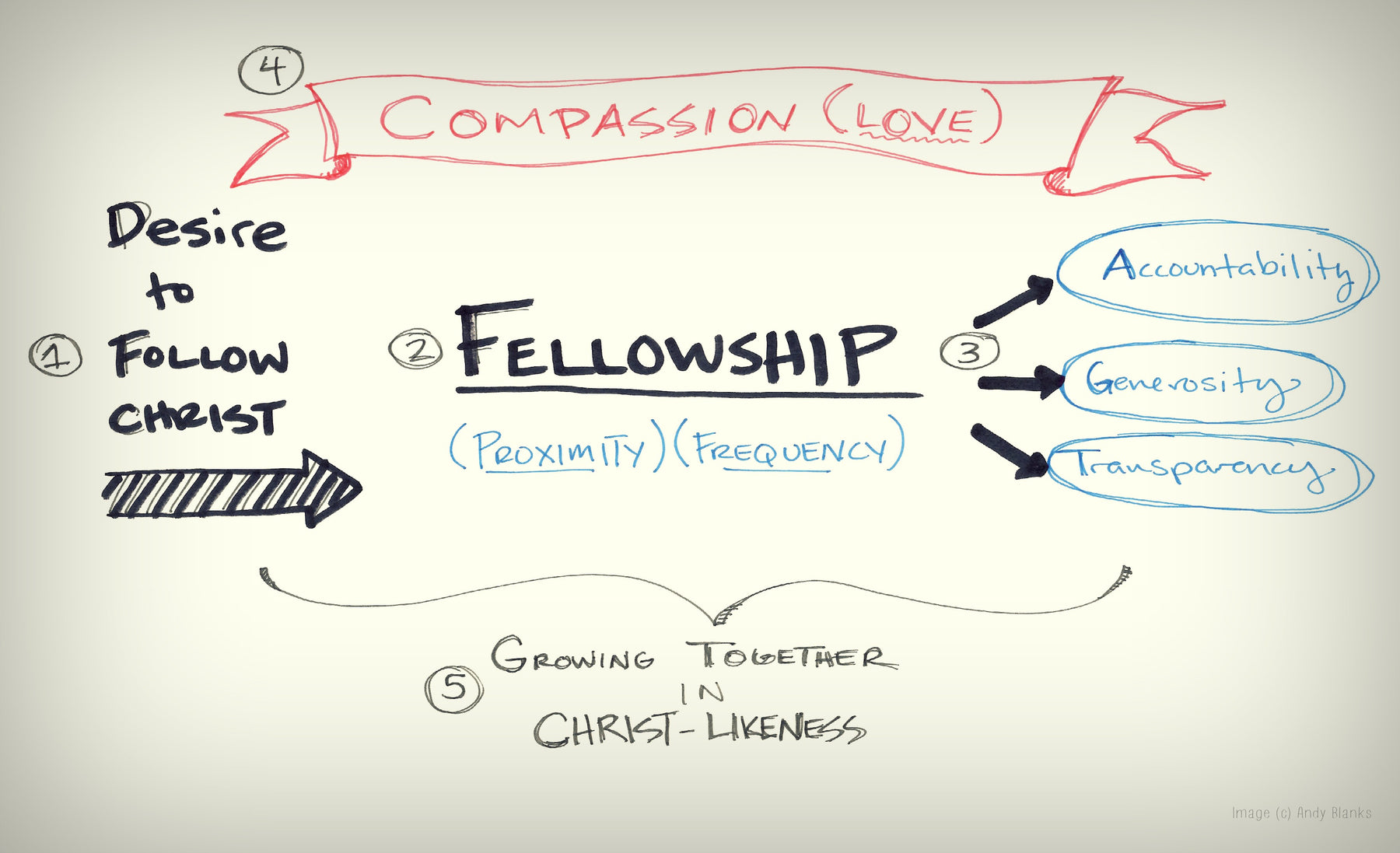
What Kind Of Community Are You Building In Your Youth Ministry?
Christ-centered community is the incubator for discipleship. I think Scripture makes this pretty clear. Following after Christ isn't supposed to happen in solitude. God designed this to happen in community.
But what kind of community are you building in your ministry?
When we search the Bible, we find that God gave us a blueprint of sorts. (Imagine that!) So, by searching Scripture with an eye for what real community looks like, I've come up with the diagram you see above. My prayer is that it will help you begin to think about the brand of community you're building as you disciple students.
When I think of biblical community, I automatically turn to Acts 2:42-47 and Acts 4:32-35. Looking at these passages, we get such a great view of the young Jerusalem Church. Through their example, I think we see the amazing potential we have for developing real community. Follow along on the diagram above as I flesh this out.
1. A Desire To Follow Christ
First and foremost, there has to be a desire and a commitment to actually grow as a follower of Christ. As we think about community, this starts with a commitment to grow in knowledge of God, with spiritual growth coming from the application of this knowledge.
- Acts 2:42 says, “They devoted themselves to the apostles’ teaching.”
- Acts 2:46 says, “Every day they continued to meet together in the temple courts.” (implied teaching)
- Acts 4:33 says, “With great power the apostles continued to testify to the resurrection of the Lord Jesus.”
This desire must be present in your students as the starting point of growing Christ-centered community. Without it, you’re just hanging out. You’re little different than any other group of people that gather. Ask yourself:
- How would describe the level of desire your students have to follow Christ?
- What can you do to help grow this desire?
2. Fellowship
Fellowship is the heart of community. Hanging out, doing life together, etc., is what it’s all about. If you think about it, it’s kind of both the means and the ends.
- Acts 2:42 says the believers were “devoted to fellowship.” Acts 2:46 says the believers met “every day.”
If you look at these passages from Acts, you get idea that fellowship has two aspects: proximity (literally being together) and frequency (being together often). Fellowship can’t happen unless we’re hanging out, doing life together, and doing it frequently. This is also where we would expect to find prayer and Scripture reading/study as well. Remember, we're after Christ-centered community, not just a fun group of friends to be around. Ask yourself:
- Are your gatherings fostering fellowship?
- Is it enough to just meet with students formally? Or do you need to find ways to meet informally outside of your programmed meeting times?
- When we gather, are we collectively growing closer to God?
3. Accountability, Transparency, Generosity
While there are probably other characteristics of community, here are three main ones I think we see: Transparency, Accountability, and Generosity. Acts 2:44-45 says, “All the believers were together and had everything in common. Selling their possessions and goods, they gave to anyone as he had need.” There is great transparency here! They weren’t concerned about image. They didn’t hesitate to openly bring their needs to the group. There’s generosity here, as well. These believers put others’ needs above their own.
James 5:16 says, “Therefore confess your sins to each other and pray for each other so that you may be healed.” Accountability can’t be forced. It grows out of community. I can only overcome my sin nature and talk to you about my sins if we are “one in heart and mind.” We have to have a track record of fellowship. I have to trust you. And you have to have my best interests in mind. Ask yourself:
- Does your group value transparency and generosity?
- Your students may not have physical needs your group can meet, but they have other needs. Is your group a place where students can openly bring spiritual and emotional needs to their friends?
4. Compassion (love)
Over all of these things flies the banner of loving compassion. Transparency, accountability, and generosity are all contrary to our human nature. The temptation is to sit in judgment of each other when we are transparent, or as we are being held accountable. Compassion and love must rule! I think the best expression of this is Galatians 6:2-3:
- “Carry each other’s burdens, and in this way you will fulfill the law of Christ. If anyone thinks he is something when he is nothing, he deceives himself.”
If there’s no love, there can be no true transparency, accountability, or generosity. And ultimately, there can be no fellowship. Ask yourself:
- Do you foster an environment of compassion in your group?
- Are your students sympathetic toward each others' unique life situations?
5. The Goal
And of course the goal of community is to grow together towards Christ-likeness.
Well, there you have it.
I wonder what you think? What did I miss? What would you add?




Leave a comment